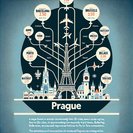
Coalition talks in Prague took a decisive turn on 24 October when election-winner ANO and its two prospective partners—the Drivers’ Party (Motorists) and the far-right SPD—announced that 95 % of their joint programme is agreed. Senior negotiator Karel Havlíček told reporters the trio will anchor the Czech Republic in the EU and NATO but will "strongly oppose" Brussels’ Migration and Asylum Pact, mirroring positions taken by Warsaw and Budapest.
The parties intend to pass legislation enabling referendums on selected international issues, while explicitly ruling out votes on EU or NATO membership. Nonetheless, they promise to block the pact’s “solidarity mechanism”, which would oblige member states either to accept relocated asylum seekers or make compensatory financial contributions. If sworn in, the government could also roll back parts of the outgoing cabinet’s Lex Ukraine humanitarian scheme and scrap a foreign-funded artillery-support programme for Kyiv.
For global mobility stakeholders the policy shift ushers in uncertainty. Corporate immigration specialists anticipate longer processing times for family-reunification and humanitarian visas if the Czech Republic narrows eligibility or introduces annual caps. Companies relocating talent from outside the EU—especially from Ukraine, the Western Balkans and North Africa—should accelerate filings ahead of any transitional cut-off dates that may form part of implementing legislation.
Business groups are already lobbying to ring-fence the Highly Qualified Worker and Key & Research Staff fast-track schemes. These programmes filled more than 20,000 vacancies in 2024/25 and are viewed as essential for the country’s booming automotive-EV and semiconductor clusters. Employers fear that an outright rejection of the EU pact without a domestic replacement could aggravate skill shortages.
President Petr Pavel will receive an update on cabinet formation on 27 October, and parliament convenes 3 November. If the coalition coalesces, detailed migration proposals could surface before year-end. Mobility managers should monitor draft bills and prepare position papers emphasising the economic value of inbound talent.
The parties intend to pass legislation enabling referendums on selected international issues, while explicitly ruling out votes on EU or NATO membership. Nonetheless, they promise to block the pact’s “solidarity mechanism”, which would oblige member states either to accept relocated asylum seekers or make compensatory financial contributions. If sworn in, the government could also roll back parts of the outgoing cabinet’s Lex Ukraine humanitarian scheme and scrap a foreign-funded artillery-support programme for Kyiv.
For global mobility stakeholders the policy shift ushers in uncertainty. Corporate immigration specialists anticipate longer processing times for family-reunification and humanitarian visas if the Czech Republic narrows eligibility or introduces annual caps. Companies relocating talent from outside the EU—especially from Ukraine, the Western Balkans and North Africa—should accelerate filings ahead of any transitional cut-off dates that may form part of implementing legislation.
Business groups are already lobbying to ring-fence the Highly Qualified Worker and Key & Research Staff fast-track schemes. These programmes filled more than 20,000 vacancies in 2024/25 and are viewed as essential for the country’s booming automotive-EV and semiconductor clusters. Employers fear that an outright rejection of the EU pact without a domestic replacement could aggravate skill shortages.
President Petr Pavel will receive an update on cabinet formation on 27 October, and parliament convenes 3 November. If the coalition coalesces, detailed migration proposals could surface before year-end. Mobility managers should monitor draft bills and prepare position papers emphasising the economic value of inbound talent.








